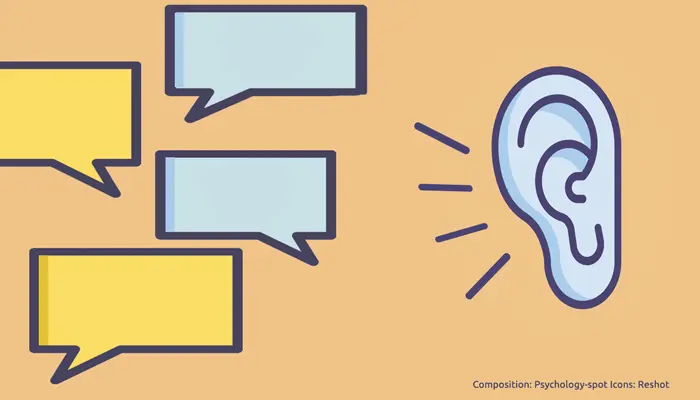
The importance of active listening is enormous, but in the rush, we have forgotten it. We listen distractedly, so that the words become a background noise with which we do not connect emotionally. Or we practice reactive listening, so that we listen to refute the arguments of our interlocutor, turning the conversation into a battlefield.
Thus we bury empathic listening and cut the bridges of dialogue and understanding while each one becomes more and more self-absorbed in their world, feeding their beliefs only with what they want to hear because it does not generate any cognitive dissonance or imply the effort to put themselves in the place of the other.
The therapeutic power of listening
We all experience the need to be heard. We have a universal need for connectivity and belonging. We need to connect with others to feel validated and accepted. When those needs are not met, our insides become a breeding ground for doubts, resentment and frustration. We can feel deeply disconnected, alone, and misunderstood.
Active listening is the antidote to alienation. It is not by chance that this is the type of listening that gave rise to psychological therapy. In the early 1880s, Josef Breuer treated the patient Anna O, whose case would influence the later work of Sigmund Freud. The patient referred to this treatment as a “talking cure.”
Since then, active and empathetic listening has been at the fore in Psychology, but it should also be at the center of our daily lives. When we stop to listen to a person and pay attention not only to his words but also to his emotions, we can connect on a deeper level. That listening has a therapeutic power.
In fact, anyone can listen. Active and empathetic listening is something else. It is an attitude towards the other, an inner disposition towards the person in front of us. For this reason, Carl Rogers was convinced of the enormous importance of active and empathetic listening in psychotherapy and believed that it was the secret of his healing power. He affirmed that doing therapy did not imply prescribing or directing the life of the person, but rather being open, empathetic, congruent and free of prejudices to accept his fears, insecurities, feelings and concerns.
The importance of active and empathetic listening in life
“When I ask you to listen to me and you start to give me advices, you have not done what I asked.
When I ask you to listen to me, and you start to tell me why I shouldn’t feel this way, you don’t respect my feelings.
When I ask you to listen to me, and you feel you have to do something to solve my problem, you do not respond to my needs.
Listen to me! All I ask is that you listen to me, not that you speak or do. Just listen to me. Advising is easy. But I am not incapable.
I may be discouraged or struggling, but I am not useless. When you do for me what I myself could do and do not need, you only contribute to my insecurity.
When you simply accept that what I feel belongs to me, even if it is irrational, then I do not have to try to make you understand it, but to begin to discover what is inside me,” wrote R. O’Donnell in 1989.
Empathic and nonjudgmental listening allows two people to connect on equal terms. In fact, it does not only imply understanding our interlocutor but returning our feelings to him. It is a listening that welcomes and embraces. That makes the person feel comfortable and accepted, so that they can repair themselves and grow from that state. By listening to that person with our whole being, being fully present, we are establishing a link and it is in that connection where the change occurs.
Through this reformulation, when we return acceptance and validation, we make that person feel heard, understood and accepted. However, the magic of active listening is that it works in two directions because it not only promotes the change of who is listened to but also of who listens.
Listening from authentic empathy implies lowering our defenses. Be receptive and put aside our prejudices. When we really listen to others, we can better understand their views and feelings, which can help us dispel our stereotypes and open the door for us to get rid of intolerance and rigidity.
Listening – really – makes us human. It opens us up mentally and emotionally to other people. It makes us more understanding and empathetic. And it helps us create a better world for all. The decision, obviously, is in our hands. We can continue closing doors to dialogue or we can open them wide from an open, empathetic and nonjudgmental position.
Sources:
Jackson, S. W. (1992) The Listening Healer in the History of Psychological Healing. Am J Psychiatry; 149(12): 1623-1632.
O’Donnell, R. (1989) La escucha. In Pangrazzi, A [ed], El mosaico de la misericordia, Sal Terrae, Santander.



